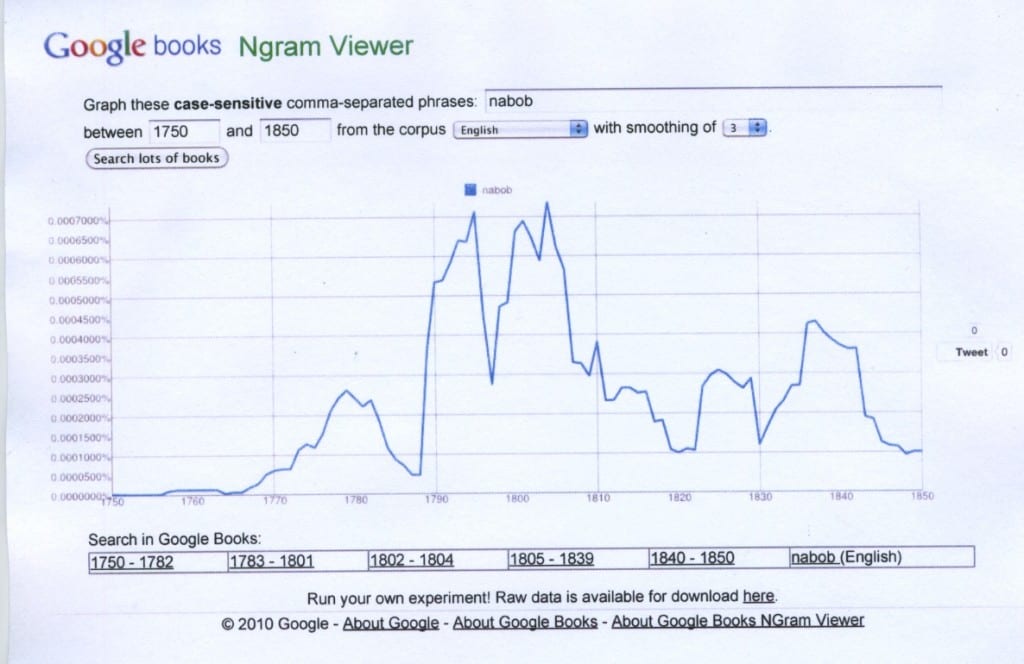‘Nabob’: The Chronology of a Concept
According to the Oxford English Dictionary the word ‘nabob’ appeared in the English language around 1612, a corruption of the Persian term ‘nawab’ which referred to high-ranking officials in the Mughal court who acted as deputy governors of provinces or districts in the Mughal Empire. By the 1760s however the word was also applied, by critics of the East India Company, to individuals of great wealth, specifically those who had returned from India with large fortunes, and used that wealth to purchase seats in Parliament.
The last three decades of the eighteenth century were a key phase in the evolution of the ‘nabob’ as a concept and a descriptor. The collapse of the East India Company’s finances in 1772, both in India and Britain, aroused public indignation towards the Company’s activities and the behaviour of the Company’s employees. In popular terms the word ‘nabob’ implied that this wealth had been acquired through corrupt practices, which in turn corrupted those who came into contact with it. In Samuel Foote’s popular comedy, The Nabob, first performed, in response to the East India Company crisis in 1772, the character of Lady Oldham describes the returned Nabob, Sir Matthew Mite: ‘preceded by all the pomp of Asia, from the Indies, came thundering amongst us; and, profusely scattering the spoils of ruined provinces, corrupted the virtue and alienated the affections of all the old friends to the family’.[i] Foote neatly juxtaposed the new wealth of the Company servant, in the character of Mite, with the reasoned equanimity of Thomas Oldham the London merchant, who trumps the newcomer’s claims by stumping up the £10,000 that his cousin owes Mite, saving the family seat, and the daughter of the household, both of which Mite seeks to possess.[ii] While the lifestyles of the nabobs were ridiculed as pretentious and ostentatious they also offered a threat to social order. As Tillman Nechtman has argued in his book Nabob: Empire and India in Eighteenth-Century Britain (2010), ‘nabobs were cultural threats because they brought empire home and threatened to naturalize it as part of the national landscape. [iii]
The mid 1770s saw a significant rise in the use of the word ‘nabob’ in literature, as the East India Company’s financial crisis deepened.[iv] The perception of the pernicious influence wielded by nabobs in both social and political life led to increased scrutiny of the East India Company. A number of prominent Company men underwent inquiries and impeachments on charges of corruption and misrule in India. Warren Hastings, first Governor-General of India, was impeached in 1788 and acquitted in 1795 after a seven year-long trial. Robert Clive, 1st Baron Clive, MP for Shrewsbury, was forced to defend himself against charges brought against him in the House of Commons. The connotations of the word nabob, understandably grew steadily worse, and more prolific in literature from the late 1780s. A hundred years later however the term rarely appeared, and had slipped out of use.
Back to Case Study Home Page / Next
[i] Samuel Foote, The Nabob; a comedy, in three acts. As it is performed at the Theatre-Royal in the Haymarket, London, printed by T. Sherlock, for T. Cadell [etc.], 1778.
[ii] Marion Moverley one of the East India at Home project associates discovered in the Journeys of a German in England, a walking tour of England in 1782 by Carl Philip Moritz: ’Last week I went twice to an English Theatre [Haymarket Theatre]. On the first occasion The Nabob by the late Samuel Foote, was played …… A Mr Palmer played The Nabob – a silly fool with a fondness of slander, suddenly become immensley rich and much sought after by cranks, natural scientists, quakers and who knows else, all seeking his membership, well he is admitted to the Society of Natural Scientists’.
[iii] Tillman Nechtman, Nabobs: Empire and India in Eighteenth–Century Britain, Cambridge University Press, 2010, p.238
[iv] Using GoogleNgram,search term ‘nabob’.
